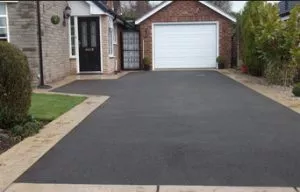
There are a number of things you should consider when contemplating a driveway surface. Some are practical, others are environmental, and some are purely aesthetic. Whatever you choose, a well‑surfaced driveway can add real curb appeal to your home. There are a number of different materials available, each of which has its own advantages and disadvantages. You want your home to look great, but you’re probably also considering your budget.
When you’re thinking about materials, you could go with a single type, or even a combination, like maybe pavers along with asphalt. You’ll have to prepare the ground properly no matter what surface you choose, but we’re not going to go into that right now – just remember that it’s important, because if the job isn’t done right, you’ll end up disappointed.
To begin with, you should decide what’s important to you. Here are some things that you should consider:
- Appearance: How will the material you choose work with other aspects of your home and yard?
- Climate: Do you live in an area where there’s a lot of snow or rain?
- Upkeep: Do you want to “get it and forget it” or are you willing to spend a bit of time on upkeep?
- Budget: How much are you willing to spend, and what are you willing to settle for?
Gravel
Gravel is definitely the most cost‑effective choice, but it’s a bit heavy on the upkeep. For one thing, you’ll need to add gravel regularly, since it will compact. You should plan to add about an extra half‑inch from time to time.
The other thing with gravel is that if you live in an area where you get snow, every time your driveway is plowed, some of the gravel is going to end up on your lawn and will need to be raked off. This can be time‑consuming.
If you’re concerned with the environment, though, gravel is a good choice. When it rains, the water will run down into the ground instead of ending up on the street and then into the sewers.
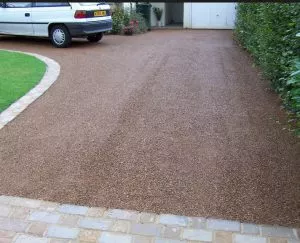
Natural stone is very similar to gravel, but more expensive. If you value your time, though, you might be happy with the extra cost, since it won’t end up on your lawn and need to be raked off.
Asphalt

Take a drive around your neighborhood, and you’ll see that asphalt is one of the most popular driveway surfacing materials. To get good results, though, the ground has to be properly prepared. An asphalt driveway also needs regular maintenance – you’ll need to apply a sealer every few years. Depending on which sealer you choose, you can actually change the color of your driveway, and if you’re feeling especially adventurous, you can also have patterns stamped in the asphalt to give it the look of expensive pavers at far less cost.
Concrete paving block
Concrete paving blocks are more costly than asphalt, but they’re also more durable if you’re bringing in heavy vehicles. They’re also more resistant to freezing and thawing. If you go with paving blocks, you can expect them to last up to 30 years. As with asphalt, surface preparation is important. They require a bit more maintenance, too – you’ll have to apply a sealant once a year.
You could also go with regular concrete, which is poured in sections so that it doesn’t heave when the weather causes it to expand and contract.
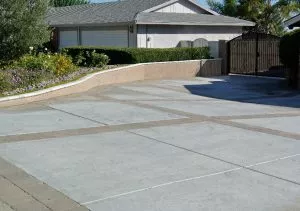
Unistone
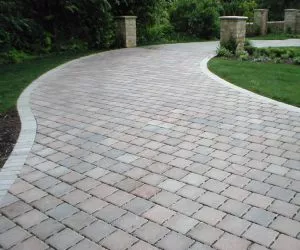
Unistone is very attractive, consisting of fitted blocks held together with sand, aggregate and cement. Maintenance is about the same as with concrete pavers, with the need for annually‑applied sealant. One huge benefit to unistone is that if damage occurs, you can just lift up a block or two, and replace, as opposed to having to dig up a huge section of driveway.
Reinforced grass
A grass driveway? Well, why not? An expanse of lawn can be quite beautiful, and with the “honeycomb” underlay that’s made of plastic, filled with soil, and then seeded in, you can have a glorious expanse of green on which to park your vehicle. Take note, though, that if you drive very heavy vehicles, this will not be a good solution, as the weight of the vehicle could compromise the plastic underlay.
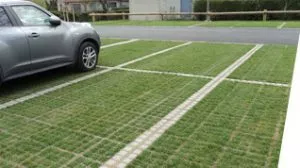
The variety pack
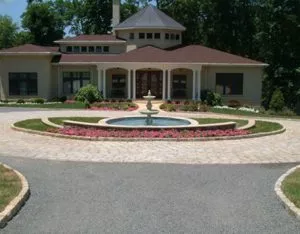
If you can’t seem to identify a single solution that’s just right for your driveway surface, why not consider a combination of materials? You might use gravel where your vehicles are actually parked, border or surround the gravel with pavers, and even add reinforced grass around key decorative elements like fountains or flower beds. There’s really no end to how you can mix things up, so there is no obvious choice, why not think about mixing two or more materials? For the areas where the vehicle actually touches the surface, there can be strips of concrete pavers, for instance, surrounded by gravel, grass or another ground covering. The choices are almost endless, so you can certainly get just the look you want for your home.
Remember the garage door!
Since you’re fixing up your driveway, why not think about a makeover for your garage door as well? Give us a call at 717-767-1419. We’ll be happy to discuss your requirements with you, and offer our input on the variety of garage doors you can choose from. We have tons of experience, and can help you to make the right choice. Also, if you want to get a really good idea of how your garage door will look before you buy, check out our Design Centre or view our image gallery to get some ideas.








Add new comment